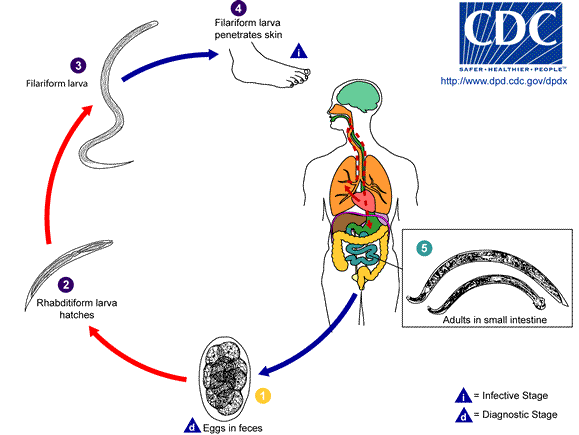Hooked on Parasites

When you’re trying to fight illness without the benefit of a lot of resources behind you, the best weapon in your arsenal is usually education. This is unfortunate, because many people don’t particularly like to learn and relatively few people really know how to teach.
Let’s say you’re a cleric working to slow the spread of a disease in a remote jungle village. There are one hundred people in the village, half of whom are infected; unless you’re high-level and extremely sub-specialized, removing disease from 50 people is probably the work of at least a week. By the time you finish curing NPC Number 50, another ten previously healthy people may have fallen ill. Some diseases can only infect a person once, after which they’re immune, but many can hit the same person again and again, so by the time you’ve cured NPC Number 60, it’s not hard to imagine that Number 6 is sick again. Eventually, with a bit of luck, you’ll probably get the disease under control, because magic is a potent tool that works quickly and efficiently. Now suppose, though, that you aren’t a cleric, but rather a mid-level Expert with maxed-out ranks in the Heal skill. You can still treat approximately the same number per day, but less reliably, less efficiently, and less instantaneously. You’ll probably get the village feeling better in time, but it’s going to be a lot of work and a lot of frustration.
Now imagine that instead of a hundred people, you’re trying to help a hundred thousand, without the time, resources, or support necessary. It’s not a terribly far-fetched scenario; this is what medical care is like in large portions of the world, and this is what medical care is almost certainly like in a medieval fantasy setting wherever people either can’t afford, or don’t have easy access to, healing magic. At a certain point, the cost-benefit ratio stops favouring treating people after they become sick, and starts arguing in favour of helping to prevent them from becoming sick in the first place.
This sort of disease situation has a perfect model in the modern world: parasitic infections. Although largely under control in the Western world, parasites – particularly worms and other nasties that get into the gut and can live there for decades – are a major health concern in developing nations, and therefore also probably in your campaign setting. To the best of modern medicine’s understanding, the best way to deal with intestinal parasites is to prevent them, because treating the infection after it’s developed is slow and unreliable in addition to being prohibitively expensive for the most at-risk people. The prevention is, in theory, very easy; the main part of it is teaching proper hand hygiene and sanitation. Healers have worked hard to reduce parasitic infections by teaching the public how to prevent them, and scientists have then been able to study the at-risk people, before and after being educated, to see if it actually made the difference that we hoped. Here’s some of what we’ve learned.
In one study, (Bieri et al, N Engl J Med. 2013,368(17):1603-12), researchers went into 38 Chinese primary schools and used one of two forms of teaching: they gave the kids either a comprehensive educational package, including an educational cartoon, or else they put up some posters about how to prevent worm infections. The results weren’t shocking; one year later, the kids who received better education knew more about parasites, were more likely to wash their hands after using the toilet, and had one half the rate of infection. The financial benefits to preventing 50% of infections are potentially enormous, but the prospect of saving kids from the side effects of drugs and reducing the risk of emergent drug-resistant parasites is also tremendously important. Your cleric might not have to worry about side effects or the evolution of spell resistance – although just imagine the story potential if they did – but the alleviation of potential suffering is incalculable.
In your campaign, this could mean some interesting things. Obviously, few storytellers are going to have their players role-play out scenes of them sitting in schools and teaching kids how to avoid falling sick, but how about when the players have to go before a mayor or a king and argue in favour of teaching disease avoidance? Consider a cleric who wants to persuade a local lord to teach the serfs how to prevent an illness, when the lord believes that the illness in question is sent by the gods as opposed to caused by worms. Consider the scholar who labours to convince townsfolk that the plague afflicting them is the result of unclean water in their wells, when the townsfolk have a vested reason not to hear it. Again, these aren’t such out-there scenarios; even as I write this, there are physicians working to fight HIV in countries where people don’t want to believe that HIV is spread through sex. Education has the potential to save lives, but many people have reasons not to want to be educated. As Woodrow Wilson once said, “If you want to make enemies, try to change something.”
Above all, this should serve as a reminder of one thing: even when you really can heal the sick with a few muttered words and a pat on the head, there’s more than one way to fight an infection.
Four years ago, Dr. Eris Lis, M.D., began writing a series of brilliant and informative posts on RPGs through the eyes of a medical professional, and this is the one that appeared here on June 29, 2013. Lis is a physician, gamer, and author of the Skirmisher Publishing LLC OGL sourcebook Insults & Injuries, which is also available for the Pathfinder RPG system.






